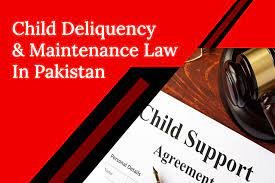- +92 302-6644789
- info@qanoonhouse.com
- Pakistan Legal Advisors, Office No. 5, 2nd Floor, Laraib Plaza, Karachi Company, G-9 Markaz.
Child Maintenance in Pakistani law and Islam
CHILD MAINTENANCE IN PAKISTANI LAW AND ITS ISLAMIC PERSPECTIVE
Child maintenance is a crucial aspect of family law that ensures the financial support and well-being of children. In Pakistan, a predominantly Muslim country, child maintenance is not only governed by the legal system but also has its roots in Islamic teachings. This article will explore child maintenance in Pakistani law and its underlying principles in Islam.
CHILD MAINTENANCE IN PAKISTANI LAW
Under Pakistani law, child maintenance is primarily addressed in the Family Courts Act 1964 and the Guardians and Wards Act 1890. The father, as the natural guardian, has the legal obligation to maintain his children financially. However, in cases of divorce or separation, both parents may have financial responsibilities depending on the circumstances. The Family Courts Act empowers family courts to determine the amount of child maintenance based on various factors such as the financial capacity of the parents, the child’s needs, and the standard of living the child was accustomed to before the separation. The courts take into account the age of the child, educational expenses, medical costs, and other necessary expenditures to arrive at a fair maintenance amount.

CHILD MAINTENANCE UNDER ISLAMIC PERSPECTIVE
Islam places significant emphasis on the financial responsibility of parents towards their children. The Islamic principles of child maintenance are derived from the Quran, Hadith (sayings of Prophet Muhammad, peace be upon him), and the consensus of Islamic scholars. In Islamic law, child maintenance is an obligation primarily on the father, known as “Nafaqah.” The father must provide for the child’s food, clothing, housing, and education, ensuring the child’s physical and emotional well-being. The amount of maintenance is determined based on the father’s financial capacity and the child’s reasonable needs.
Islam also recognizes the financial responsibilities of the mother, especially when she has custody of the child. If the mother is capable and willing to provide for the child’s needs, she may contribute financially, but it does not absolve the father from his primary responsibility.
UNVEILING THE LEGAL FRAMEWORK FOR CHILD MAINTENANCE IN PAKISTAN: ENSURING THE FINANCIAL WELFARE OF CHILDREN
Child maintenance is a crucial aspect of family law that aims to safeguard the financial well-being of children. In Pakistan, the legal framework for child maintenance provides a comprehensive structure to address the financial responsibilities of parents towards their children. This article explores the legal provisions, processes, and challenges associated with child maintenance in Pakistan, emphasizing the significance of ensuring the financial welfare of children.

UNDERSTANDING CHILD MAINTENANCE
Child maintenance refers to the financial support provided by parents to meet the basic needs of their children, including food, clothing, housing, education, and medical expenses. It is an obligation imposed by law to secure the best interests of the child
Legal Services
Our Attorney

Popular Service
Provincial Tax Authorities
Misc. Services
Recent Article
GUARDIANS AND WARDS ACT, 1890
The Guardians and Wards Act serves as the foundation for child maintenance in Pakistan. It outlines the rights and obligations of parents, custodians, and guardians regarding the upbringing and maintenance of children.
ROLE OF FAMILY COURTS
Family courts play a crucial role in adjudicating child maintenance cases. They have the jurisdiction to determine the appropriate amount of maintenance based on the circumstances, needs of the child, and financial capacity of the parents.
FACTORS CONSIDERED
The legal framework takes into account various factors when determining child maintenance, including the child’s age, educational requirements, medical expenses, standard of living, and the financial capability of the parents.
FINANCIAL OBLIGATIONS OF PARENTS
Under Pakistani law, the father has a primary legal obligation to provide for the maintenance of his children. However, in certain situations, the mother or other relatives may also be held responsible for child maintenance.


OBLIGATIONS IN CASES OF DIVORCE
In cases of divorce, the courts may order the father to provide maintenance for his children. The amount is determined based on the child’s needs, the father’s financial resources, and the standard of living the child was accustomed to before the separation.
ENFORCEMENT CHALLENGES
One of the significant challenges in child maintenance cases is the enforcement of court orders. Non-compliance by the responsible parent often leads to financial hardships for the child, requiring a robust enforcement mechanism.
LEGAL REMEDIES AND PENALTIES
The legal framework provides remedies for enforcing child maintenance orders, including attachment of property, garnishment of wages, and imprisonment for non-compliance. However, implementation and enforcement remain areas of concern.
MEDIATION AND ALTERNATIVE DISPUTE RRESOLUTION
Mediation and alternative dispute resolution mechanisms can play a vital role in resolving child maintenance disputes. These approaches offer a more amicable and collaborative environment for parents to reach a mutually beneficial agreement.
LEGAL AID AND SUPPORT SERVICES
To ensure access to justice, legal aid services are available for individuals who cannot afford legal representation. These services provide assistance to parents in navigating child maintenance proceedings.
OBLIGATIONS OF PARENTS IN CHILD MAINTENANCE UNDER PAKISTANI LAW: ENSURING FINANCIAL SUPPORT FOR CHILDREN
Child maintenance is a fundamental aspect of family law, emphasizing the financial responsibilities of parents towards their children. In Pakistan, the legal system imposes specific obligations on parents to ensure the well-being and financial support of their children. This article explores the obligations of parents in child maintenance cases under Pakistani law, highlighting the significance of fulfilling these duties for the welfare of children.
FINANCIAL RESPONSIBILITY OF PARENTS
Pakistani law recognizes that parents have a legal and moral obligation to provide financial support for their children. This responsibility extends to meeting the child’s basic needs, including food, clothing, housing, education, healthcare, and overall well-being.
THE FATHER’S PRIMARY OBLIGATION
Under Pakistani law, the father has a primary obligation to maintain his children financially. This responsibility arises regardless of whether the parents are married, divorced, or separated. The father’s obligation remains intact, emphasizing the importance of his role in the child’s life.
MOTHER’S RESPONSIBILITY
While the father holds the primary responsibility, Pakistani law also acknowledges that the mother has an obligation to contribute to the child’s maintenance. This obligation arises in situations where the mother has sufficient means and financial capacity.


EQUAL SHARING OF FINANCIAL RESPONSIBILITY
In cases of divorce or separation, Pakistani law promotes the principle of equitable sharing of financial responsibility between the parents. The court considers the financial capabilities of both parents and ensures that the child’s needs are adequately met.
DETERMINING THE AMOUNT OF CHILD MAINTENANCE
The courts in Pakistan assess various factors when determining the amount of child maintenance, including the child’s needs, the standard of living the child was accustomed to before the separation, and the financial capacity of the parents. The aim is to maintain a reasonable standard of living for the child.
ADJUSTMENTS BASED ON CIRCUMSTANCES
Child maintenance obligations may be adjusted based on the specific circumstances of each case. This flexibility ensures that the amount of maintenance is fair and reasonable, considering factors such as financial status, earning capacity, and other relevant aspects of the parents.
CHANGES IN FINANCIAL CIRCUMSTANCES
If there is a significant change in either parent’s financial circumstances, such as loss of employment or substantial increase in income, the court may review and modify the child maintenance order accordingly to reflect the new situation.
CONTINUATION OF MAINTENANCE AFTER REMARRIAGE
Child maintenance obligations in Pakistan generally continue even if the parent responsible for maintenance remarries. The parent’s new marital status does not absolve them of their financial responsibilities towards their children.
ENFORCEMENT OF CHILD MAINTENANCE ORDERS
Enforcement of child maintenance orders is crucial to ensure that children receive the financial support they are entitled to. Pakistani law provides measures to enforce maintenance orders, including attachment of property, garnishment of wages, and imprisonment for non-compliance.
MEDIATION AND ALTERNATIVE DISPUTE RESOLUTION
In child maintenance cases, mediation and alternative dispute resolution methods are encouraged to facilitate amicable agreements between parents. These approaches can help foster cooperation, reduce conflict, and ensure the best interests of the child.
DETERMINING CHILD MAINTENANCE AMOUNT IN PAKISTANI COURTS: ENSURING FAIR FINANCIAL SUPPORT FOR CHILDREN
Child maintenance plays a vital role in securing the financial well-being of children in Pakistan. When parents separate or divorce, determining the appropriate amount of child maintenance becomes a crucial aspect of family law. This article explores the process and factors involved in determining the child maintenance amount in Pakistani courts, highlighting the significance of ensuring fair financial support for children.
IMPORTANCE OF DETERMINING CHILD MAINTENANCE
Determining the child maintenance amount is essential for protecting the rights and welfare of children. It ensures that they receive adequate financial support to meet their basic needs, educational expenses, healthcare costs, and maintain an acceptable standard of living.
ROLE OF PAKISTANI COURTS
Pakistani courts, particularly the family courts, have the authority to determine the child maintenance amount based on the specific circumstances of each case. They strive to achieve fairness and justice while considering the best interests of the child.
CHILD’S NEEDS AND LIVING STANDARD
When determining child maintenance, Pakistani courts give utmost importance to the child’s needs and the standard of living the child was accustomed to before the separation. This ensures that the child’s financial support is consistent with their accustomed lifestyle.


FINANCIAL CAPACITY OF PARENTS
The courts evaluate the financial capacity of both parents when deciding the child maintenance amount. This includes assessing their income, assets, employment status, earning potential, and any other relevant financial resources.
PARENTAL OBLIGATIONS AND EXPENDITURES
Pakistani courts take into account the various obligations and expenditures associated with raising a child. This includes costs related to education, healthcare, housing, food, clothing, transportation, and other essential expenses.
AGE AND SPECIFIC NEEDS OF THE CHILD
The age of the child and their specific needs are crucial factors in determining the child maintenance amount. Younger children may require more financial support for daycare, while older children may have additional educational or extracurricular expenses.
EDUCATION EXPENSES
Education holds significant importance in Pakistani society. Therefore, the courts consider the child’s educational requirements and expenses, including school fees, tuition, books, uniforms, and other related costs when determining the child maintenance amount.
HEALTHCARE AND MEDICAL COSTS
The courts also take into account the child’s healthcare and medical expenses. This includes the costs of routine check-ups, vaccinations, medications, and any specific medical needs or conditions the child may have.
STANDARD OF LIVING
Maintaining a standard of living consistent with what the child was accustomed to before the separation is a crucial consideration for Pakistani courts. This ensures that the child’s financial support is in line with their previous lifestyle, preventing any significant disruptions.
FINANCIAL ADJUSTMENTS AND MODIFICATIONS
Child maintenance orders can be modified or adjusted based on changes in the financial circumstances of either parent. If there are significant changes in income, employment, or other relevant factors, the courts can review and modify the child maintenance amount accordingly.
FINANCIAL RESPONSIBILITIES OF FATHERS IN CHILD MAINTENANCE IN PAKISTAN
In Pakistan, fathers bear the primary financial responsibility for child maintenance. Regardless of marital status or custody arrangements, fathers are obligated to provide for their children’s financial needs, including food, clothing, housing, education, and healthcare. This legal obligation emphasizes the importance of fathers in ensuring the well-being and stability of their children’s lives. By fulfilling their financial responsibilities, fathers contribute to the holistic development and future prospects of their children under the Pakistani legal framework.
THE MOTHER’S FINANCIAL OBLIGATIONS IN CHILD MAINTENANCE UNDER PAKISTANI LAW
Under Pakistani law, mothers also have financial obligations in child maintenance. While the primary responsibility rests with the father, in situations where the mother has sufficient means and financial capacity, she is expected to contribute to the child’s financial support. This recognition underscores the importance of shared responsibility between parents in ensuring the well-being of their children. By fulfilling their financial obligations, mothers play a vital role in providing a stable and nurturing environment for their children. Pakistani law recognizes the importance of both parents’ involvement in child maintenance, promoting fairness and equality in the financial support provided to children.
ENFORCEMENT OF CHILD MAINTENANCE ORDERS IN PAKISTAN
Enforcement of child maintenance orders in Pakistan is a critical aspect of ensuring that children receive the financial support they are entitled to. The legal system provides mechanisms to enforce these orders, including attachment of property, garnishment of wages, and imprisonment for non-compliance. However, challenges persist in implementing and enforcing these orders effectively. Strengthening enforcement measures, raising awareness about the consequences of non-compliance, and improving coordination between relevant authorities are essential steps in safeguarding children’s rights and welfare.
PENALTIES FOR NON-COMPLIANCE WITH CHILD MAINTENANCE ORDERS IN PAKISTAN
Non-compliance with child maintenance orders in Pakistan can lead to penalties and consequences for the responsible parent. The legal system provides various measures to address non-compliance, ensuring that children receive the financial support they deserve. Penalties may include fines, attachment of property, garnishment of wages, or even imprisonment for repeated or deliberate non-payment. These penalties aim to enforce compliance and emphasize the importance of meeting financial obligations towards children. By imposing consequences for non-compliance, Pakistani law seeks to protect the rights and well-being of children and promote a culture of accountability and responsibility among parents.
EVOLVING TRENDS AND REFORMS IN CHILD MAINTENANCE LAWS IN PAKISTAN.
Evolving trends and reforms in child maintenance laws in Pakistan reflect a growing recognition of the importance of protecting the rights and welfare of children. Efforts are being made to strengthen the legal framework by addressing enforcement challenges, promoting fair and equitable determination of maintenance amounts, and streamlining processes for efficient resolution of child maintenance disputes. Reforms focus on improving access to justice, enhancing enforcement mechanisms, and increasing awareness about child maintenance rights and responsibilities. These evolving trends aim to create a more robust system that ensures children receive the financial support they need for their development and well-being. By adapting to changing societal needs and incorporating international best practices, Pakistan is striving to align its child maintenance laws with the evolving global standards and ensure the protection of children’s rights.
Karachi Office:
M-51, Muneer Mobile Mall, Block 17, Near Perfume Chowk & Jauhar Chowrangi, Gulistan-e-Jauhar.
Islamabad Office:
Pakistan Legal Advisors, Office No. 5, 2nd Floor, Laraib Plaza, Karachi Company, G-9 Markaz.
Lahore Office:
Qanoon Online, 2nd Floor, Al-Mairaj Arcade, Near Surayya Azeem Trust Hospital, Chauburji Chowk.
Copyright © 2023 Design by Digitocrate (Pvt) LTD
